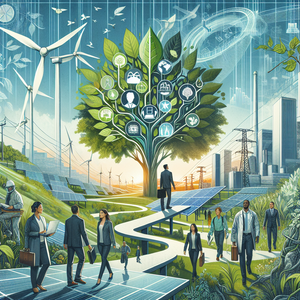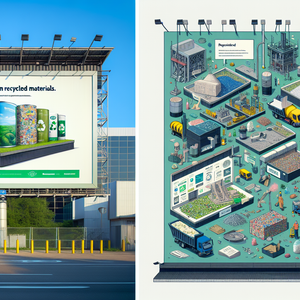Sustainable Careers: How Nestlé is Shaping the Future of Employment

Nestlé's commitment to sustainability is evident in its ambitious goals, such as achieving zero net greenhouse gas emissions by 2050 and ensuring that all of its packaging is recyclable or reusable by 2025. These objectives are not just lofty aspirations; they are driving the creation of new roles and redefining existing ones across the organization. For instance, the rise of sustainability-focused positions has led to the establishment of roles such as Sustainability Managers, Circular Economy Specialists, and Eco-Design Engineers. These professionals are tasked with developing and implementing strategies that reduce environmental impact while also driving innovation. This shift reflects a broader trend in the job market, where sustainability is becoming a core competency sought by employers across various industries.
Supporting Examples
The role of Sustainability Managers at Nestlé, for example, involves overseeing projects that not only comply with the company’s sustainability objectives but also engage local communities. These managers work on initiatives that reduce waste, promote sustainable sourcing, and enhance energy efficiency within the company’s operational framework. Similarly, Eco-Design Engineers are essential in rethinking product design and packaging to minimize environmental impact. By collaborating with product development teams, these engineers ensure that new products comply with sustainability standards from inception to market launch.
Employee Perspectives: Voices from the Field
To gain a deeper understanding of how Nestlé's sustainability initiatives are shaping careers, we spoke to several employees involved in eco-friendly projects. Maria, a Sustainability Manager based in Switzerland, shared her experience: “When I joined Nestlé, I was thrilled to see how seriously the company takes its environmental responsibilities. My role allows me to work on projects that not only benefit the company but also have a positive impact on the planet.” Similarly, John, an Eco-Design Engineer, emphasized the collaborative nature of sustainability work at Nestlé. “I work closely with cross-functional teams to redesign packaging materials that are not only sustainable but also cost-effective. It’s empowering to know that my work contributes to our global sustainability goals.” These firsthand accounts highlight the enthusiasm and dedication of employees who are motivated by the opportunity to contribute to significant environmental initiatives.
Training and Development for Sustainable Careers
Recognizing the need for a skilled workforce capable of driving sustainability initiatives, Nestlé has invested in training and development programs aimed at equipping employees with the necessary skills. The company offers workshops, online courses, and mentorship programs that focus on sustainability practices and principles. Employees are encouraged to participate in these programs, further enhancing their career trajectories while fostering a culture of sustainability within the organization. For example, the “Sustainability Champions” program empowers employees to spearhead local initiatives in their communities and workplaces. Participants learn about sustainable practices and are given resources to implement changes, from waste reduction to energy conservation. This initiative not only cultivates leadership skills but also instills a sense of ownership and responsibility towards sustainability.
Challenges and Opportunities Ahead
While Nestlé's sustainability efforts are commendable, the journey is not without its challenges. Transitioning to more sustainable practices often requires significant investment and a shift in company culture. Some employees expressed concerns about the pace of change and the need for continuous education on evolving sustainability issues. However, these challenges also present opportunities for innovation. As the demand for sustainable products grows, Nestlé is in a prime position to lead the charge in developing new solutions that meet consumer needs. This dynamic landscape creates a fertile ground for career growth, as employees are encouraged to think creatively and propose new ideas that align with sustainability goals.
Nestlé’s commitment to sustainability is transforming the way the company approaches employment, creating exciting new opportunities and redefining existing roles. By championing eco-friendly initiatives and investing in employee development, Nestlé is not only enhancing its own workforce but also setting a precedent for other companies to follow. As we move forward, the intersection of sustainability and employment will continue to evolve, making it imperative for organizations to prioritize environmental stewardship in their business strategies. For those looking to build a career that makes a meaningful impact, working at Nestlé offers a unique opportunity to be part of a movement that is shaping the future of employment—one that values sustainability as a core principle. With the ongoing commitment to integrating sustainability into every aspect of its operations, Nestlé is not just shaping careers; it is cultivating a workforce that will drive positive change for future generations.
Sustainability Analyst
Nestlé, Unilever, Procter & Gamble
Core Responsibilities
Analyze sustainability data to track progress against environmental goals and benchmarks.
Develop reports and presentations to communicate findings to stakeholders and management.
Collaborate with various departments to implement sustainability initiatives and monitor their effectiveness.
Required Skills
Proficiency in data analysis tools (e.g., Excel, Tableau).
Strong understanding of sustainability metrics and reporting frameworks (e.g., GRI, CDP).
Excellent communication and project management skills.
Circular Economy Specialist
Nestlé, Coca-Cola, Philips
Core Responsibilities
Design and implement strategies to promote circularity in product life cycles, focusing on reducing waste and enhancing resource efficiency.
Conduct lifecycle assessments to identify opportunities for sustainability improvements.
Engage with suppliers and partners to develop closed-loop systems and sustainable sourcing practices.
Required Skills
Knowledge of circular economy principles and practices.
Experience with lifecycle assessment tools and methodologies.
Strong interpersonal skills to facilitate collaboration across various stakeholders.
Eco-Design Engineer
Nestlé, General Electric, Tesla
Core Responsibilities
Collaborate with product development teams to design products and packaging that meet sustainability standards.
Conduct material assessments to choose eco-friendly alternatives for production.
Engage in iterative design processes to enhance product recyclability and reduce carbon footprints.
Required Skills
Degree in engineering, industrial design, or a related field with a focus on sustainability.
Familiarity with design software (e.g., CAD) and eco-design tools.
Strong problem-solving skills to innovate sustainable solutions.
Sustainability Communications Manager
Nestlé, WWF, The Nature Conservancy
Core Responsibilities
Develop and execute communication strategies that promote the company’s sustainability initiatives and achievements.
Create content for various channels, including social media, press releases, and internal communications.
Collaborate with sustainability teams to ensure messaging aligns with corporate goals and values.
Required Skills
Excellent writing and storytelling abilities, with a focus on environmental topics.
Experience in public relations or corporate communications.
Strong understanding of sustainability issues and trends.
Renewable Energy Project Manager
Nestlé, Siemens, NextEra Energy
Core Responsibilities
Oversee the planning, execution, and monitoring of renewable energy projects, such as solar or wind installations.
Coordinate with engineering teams and external contractors to ensure project timelines and budgets are met.
Evaluate project performance and report on energy savings and carbon reduction impacts.
Required Skills
Background in project management with experience in renewable energy sectors.
Strong knowledge of energy regulations, technologies, and market dynamics.
Proficiency in project management software and tools (e.g., MS Project, Asana).


